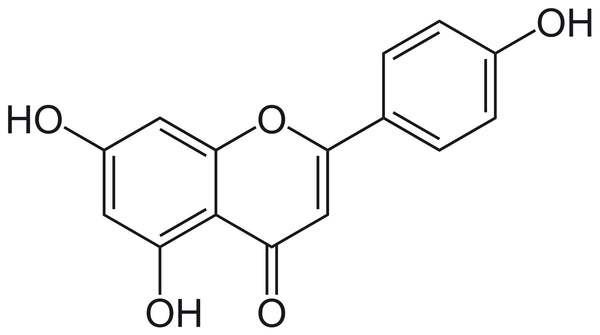Apigenin: Chamomile's Secret for Stress & Anxiety
Anxiety disorders are among the most common psychiatric conditions affecting teenagers and adults.
A variety of medications have been developed and prescribed to anxious/depressed individuals over the years; however, these “solutions” can also produce a variety of adverse effects (including ones affecting your sexual health and performance).[1,2,3,4]
This can result in stopping treatment and leaving individuals right back where they started (or in worse condition).
Natural therapies for anxiety and depression have existed for centuries, and modern science has begun to uncover the various mechanisms behind these age-old remedies.
Today we’re looking at one of the most common calming agents on the market, with a spotlight feature on its key active ingredient -- chamomile and apigenin.
Chamomile for Anxiety & Depression

Chamomile is one of the most popular herbal remedies around the world and can be found in the pharmacopeia of 26 countries.[5] Traditionally, it is brewed as an herbal tea to help relieve feelings of stress and set the stage for a peaceful night’s rest.
Various extracts of the herb have also been used for quite some time in relaxation supplements and sleep aids. Previous research has demonstrated that using chamomile may help to reduce worrying as well as depression.[6,7,8]
At the heart of chamomile’s calming effects are a slew of bioactive compounds, including flavanoids, with anxiogenic and anxiolytic properties. One, in particular, has skyrocketed in popularity and usage in the industry, thanks in part to being mentioned on Andrew Huberman’s podcast (though, truth be told, I first came across the ingredient in Glaxon’s Tranquility).
The alkaloid to which I am referring is none other than apigenin.
What is Apigenin?

Apigenin is a flavonoid structurally similar to other well-known botanical bioactives, including quercetin, luteolin, and kaempferol.
It’s primarily found in celery, parsley and chamomile, but it can also be synthesized in the body from the amino acids phenylalanine and tyrosine.[9]
Pay attention to this last point, because it will be of interest later on.
Researchers have shown that apigenin possesses a wide range of noteworthy effects, including[9,14]:
- Antioxidant
- Anti-inflammatory (downregulates IL-1β and TNF-α and reduces the expression of COX-2 and iNOS)
- Anti-hyperglycemic
- Anti-apoptotic effects
- Blood pressure reduction
- Chemo-preventive
Despite the structural similarities, apigenin offers some rather intriguing benefits in regard to mood, mental well-being, and cognitive function.
Calming Properties of Apigenin

Apigenin exerts its calming effects due to its ability to cross the blood-brain barrier (BBB), a highly selective, semi-permeable membrane that allows certain compounds to enter while restricting other ones, thereby offering neuroprotection.
Research indicates that apigenin possesses a greater ability to cross the blood-brain barrier than other popular flavonoids/antioxidants, including quercetin, rutin, and hesperidin. The only two flavonoids that were superior to apigenin (as found in this study) were genistein (a phytoestrogen found in soybeans) and isoliquiritigenin (a component of licorice).[10]
After crossing the blood-brain barrier, apigenin has an affinity for the GABAA-receptor.
GABA is the primary inhibitory neurotransmitter, and GABAA receptors are a major target for drugs used to treat anxiety and other neuropsychiatric disorders.[11]
Researchers also posit that apigenin may possibly improve mood and reduce feelings of anxiety via modulation of dopamine, serotonin, and noradrenaline.[9,12]
Additionally, apigenin can inhibit both MAO-A and MAO-B -- an enzyme that metabolizes certain neurotransmitters, including dopamine.
Lastly, studies demonstrate that apigenin stimulates the uptake of L-tyrosine, a dopamine and noradrenaline precursor.[13]
What’s the Recommended Dosage for Apigenin?
Research on direct supplementation with apigenin in humans is severely lacking. That being said, apigenin has a low toxicity and is considered by researchers to be safe, even when consumed in larger amounts that what is commonly seen in dietary supplements.
Speaking of dietary supplements, the typical apigenin dosage included in most products ranges between 25-50mg.
Studies finding a reduction in anxiety from chamomile supplementation used chamomile extracts standardized to a content of 1.2% apigenin.[6,7,8]
Participants in those studies received between 1,100-1,500mg of chamomile extract (std. to 1.2% apigenin), yielding 13.2-18mg apigenin.[6,7,8]
Earlier studies in mice that initially documented apignenin’s anxiolytic effects used much higher dosages (10-100mg/kg).[15]
To convert the dose from mouse to human equivalent dose, divide it by 12.3, and then multiply by your weight in kilograms.[16]
Converting to a Human Equivalent Dose for an 80kg male (176lbs), you would need to consume between 65-650mg.[16]
Keep in mind that at the upper end range of dosing (30-100mg/kg in mice), apigenin was noted to exert a strong sedative action.[16]
Is Apigenin Safe?
Apigenin has low toxicity, and both apigenin and chamomile are considered safe, even when consumed long-term.
Bioavailability Concerns
Apigenin is a biopharmaceutics classification system (BCS) class II substance, which means it has very low solubility in water coupled with a high permeability.[17]
This essentially means that apigenin has low bioavailability due to not dissolving very well in water, BUT it is readily absorbed in the gut.
As a result, various delivery-enhancing techniques (phytosomes, liposomes, polymeric micelles, nanosuspension, etc.) may be a superior option vs isolated apigenin.[18,19,20,21]
That being said, few (if any) products on the market include an “enhanced” form of apigenin.
Is Apigenin Worth It?
Like many supplements, apigenin (mechanistically) is very intriguing, lacks adequate research in humans, and has been overhyped by many outlets.
Nevertheless, it does have a high safety profile, and could be worth trying.
When introducing any new supplement into your regimen, keep everything else constant (diet, exercise, daily supplement intake, etc.) to eliminate as many variables as possible, buy from a reputable supplier, and start on the lower end of the dosing range.
Would apigenin be on my “top 5” for stress-relieving supplements?
No, but if you’ve already tried (are using) the likes of ashwagandha, theanine, bacopa monnieri, magnolia bark extract, lemon balm extract, and/or saffron, then apigenin is worth consideration.
What’s your opinion on apigenin?
Are you using it for stress management, testosterone support, or another reason?
References
- Amsterdam JD, Garcia-Espana F, Goodman D, et al. Breast enlargement during chronic SSRI therapy. J Affective Disord. 1997;46:151Y156.
- Sussman N, Ginsberg D. Rethinking side effects of the selective serotonin reuptake inhibitors: sexual dysfunction and weight gain. Psychiatry Annals. 1998;28:89Y97.
- Landy K, Rosani A, Estevez R. Escitalopram. [Updated 2023 Jan 28]. In: StatPearls [Internet]. Treasure Island (FL): StatPearls Publishing; 2023 Jan-. Available from: https://www.ncbi.nlm.nih.gov/books/NBK557734/
- Mitte K, Noack P, Steil R, Hautzinger M. A meta-analytic review of the efficacy of drug treatment in generalized anxiety disorder. J. Clin. Psychopharmacol. 2005;25:141–150.
- Salamon I. Chamomile, a medicinal plant. Herb Spice Med Plant Digest. 1992;10:1–4.
- Amsterdam, J. D., Li, Y., Soeller, I., Rockwell, K., Mao, J. J., & Shults, J. (2009). A Randomized, Double-Blind, Placebo-Controlled Trial of Oral Matricaria recutita (Chamomile) Extract Therapy for Generalized Anxiety Disorder. Journal of Clinical Psychopharmacology, 29(4), 378–382. doi:10.1097/jcp.0b013e3181ac93
- Amsterdam JD, Shults J, Soeller I, Mao JJ, Rockwell K, Newberg AB. Chamomile (Matricaria recutita) may provide antidepressant activity in anxious, depressed humans: an exploratory study. Altern Ther Health Med. 2012 Sep-Oct;18(5):44-9. PMID: 22894890; PMCID: PMC3600408.
- Mao JJ, Xie SX, Keefe JR, Soeller I, Li QS, Amsterdam JD. Long-term chamomile (Matricaria chamomilla L.) treatment for generalized anxiety disorder: A randomized clinical trial. Phytomedicine. 2016 Dec 15;23(14):1735-1742. doi: 10.1016/j.phymed.2016.10.012. Epub 2016 Oct 24. PMID: 27912875; PMCID: PMC5646235.
- Salehi B, Venditti A, Sharifi-Rad M, Kręgiel D, Sharifi-Rad J, Durazzo A, Lucarini M, Santini A, Souto EB, Novellino E, Antolak H, Azzini E, Setzer WN, Martins N. The Therapeutic Potential of Apigenin. Int J Mol Sci. 2019 Mar 15;20(6):1305. doi: 10.3390/ijms20061305. PMID: 30875872; PMCID: PMC6472148.
- Yang Y., Bai L., Li X., Xiong J., Xu P., Guo C., Xue M. Transport of active flavonoids, based on cytotoxicity and lipophilicity: An evaluation using the blood-brain barrier cell and Caco-2 cell models. Toxicol. In Vitro. 2014;28:388–396. doi: 10.1016/j.tiv.2013.12.002.
- Korpi ER, Sinkkonen ST. GABA(A) receptor subtypes as targets for neuropsychiatric drug development. Pharmacol Ther. 2006;109:12–32. doi: 10.1016/j.pharmthera.2005.05.009.
- Nakazawa T., Yasuda T., Ueda J., Ohsawa K. Antidepressant-like effects of apigenin and 2,4,5-trimethoxycinnamic acid from Perilla frutescens in the forced swimming test. Biol. Pharm. Bull. 2003;26:474–480. doi: 10.1248/bpb.26.474.
- Morita K., Hamano S., Oka M., Teraoka K. Stimulatory actions of bioflavonoids on tyrosine uptake into cultured bovine adrenal chromaffin cells. Biochem. Biophys. Res. Commun. 1990;171:1199–1204. doi: 10.1016/0006-291X(90)90812-2.
- Kumar V, Kundu S. Studies on Apigenin and Its Biological and Pharmacological Activity in Brain Disorders. Adv Pharm Bull. 2022 Aug;12(4):645-648. doi: 10.34172/apb.2022.068. Epub 2022 Jan 3. PMID: 36415642; PMCID: PMC9675917.
- Viola H, Wasowski C, Levi de Stein M, Wolfman C, Silveira R, Dajas F, Medina JH, Paladini AC. Apigenin, a component of Matricaria recutita flowers, is a central benzodiazepine receptors-ligand with anxiolytic effects. Planta Med. 1995 Jun;61(3):213-6. doi: 10.1055/s-2006-958058. PMID: 7617761.
- Nair AB, Jacob S. A simple practice guide for dose conversion between animals and human. J Basic Clin Pharm. 2016 Mar;7(2):27-31. doi: 10.4103/0976-0105.177703. PMID: 27057123; PMCID: PMC4804402.
- Zhang J.J., Liu D.P., Huang Y.T., Gao Y., Qian S. Biopharmaceutics classification and intestinal absorption study of apigenin. Int. J. Pharm. 2012;436:311–317. doi: 10.1016/j.ijpharm.2012.07.002.
- Telange DR, Patil AT, Pethe AM, Fegade H, Anand S, Dave VS. Formulation and characterization of an apigenin-phospholipid phytosome (APLC) for improved solubility, in vivo bioavailability, and antioxidant potential. Eur J Pharm Sci. 2017 Oct 15;108:36-49. doi: 10.1016/j.ejps.2016.12.009. Epub 2016 Dec 8. PMID: 27939619.
- Ding B.Y., Chen H., Wang C., Zhai Y.J., Zhai G.X. Preparation and in-vitro evaluation of apigenin loaded lipid nanocapsules. J. Nanosci. Nanotechnol. 2013;13:6546–6552. doi: 10.1166/jnn.2013.7763.
- Le-Ngoc Vo C., Park C., Lee B.J. Current trends and future perspectives of solid dispersions containing poorly water-soluble drugs. Eur. J. Pharm. Biopharm. 2013;85:799–813.
- Kazi M, Alhajri A, Alshehri SM, Elzayat EM, Al Meanazel OT, Shakeel F, Noman O, Altamimi MA, Alanazi FK. Enhancing Oral Bioavailability of Apigenin Using a Bioactive Self-Nanoemulsifying Drug Delivery System (Bio-SNEDDS): In Vitro, In Vivo and Stability Evaluations. Pharmaceutics. 2020 Aug 10;12(8):749. doi: 10.3390/pharmaceutics12080749. PMID: 32785007; PMCID: PMC7465069.
